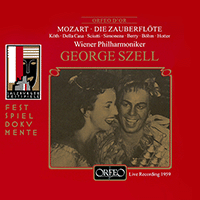Kurt Böhme
Kurt Böhme studied singing at the Dresden Conservatory with Adolf Kluge and made his operatic stage debut in 1930 at Bautzen as The Hermit / Der Freischütz. Shortly afterwards he joined the ensemble of the Dresden State Opera, making his debut there as Fafner / Das Rheingold and remaining as a stalwart member of the company for the twenty years up to 1950. He took part in several important world premieres and created the roles of Count Dominik / Arabella (1933) and Vanuzzi / Die schweigsame Frau (1935) (later becoming a distinguished interpreter of the central role of Sir Morosus), both by Richard Strauss. Other first performances at Dresden in which he participated included Münchhausen by Mark Lothar (1933), Der Günstling by Rudolf Wagner-Régeny (1935), Massimilla Doni by Othmar Schoeck (1937), Romeo und Julia (1940) and Die Zauberinsel (1942) both by Heinrich Sutermeister, and Die Hochzeit des Jobs by Joseph Haas (1944).
The first of Böhme’s many appearances at the Salzburg Festival came in 1941; he sang there regularly until 1959, his parts including Baron Ochs / Der Rosenkavalier, Osmin / Die Entführung aus dem Serail, Sarastro / Die Zauberflöte, Dr Bartolo / Le nozze di Figaro and Kaspar / Der Freischütz. Among the contemporary operas performed at Salzburg in which he appeared were The Rape of Lucretia by Benjamin Britten (1950), Penelope and Die Schule der Frauen by Rolf Liebermann (1954 and 1957) and Irische Legende by Werner Egk (1954).
Böhme joined the Bavarian State Opera in Munich in 1950 and was based there for the rest of his operatic career. Between 1955 and 1966 he also sang regularly with the Vienna State Opera. He first appeared at Covent Garden in 1936 during guest performances by the Dresden State Opera, singing Dr Bartolo / Le nozze di Figaro and the Commendatore / Don Giovanni; and returned regularly between 1956 and 1970, as Hunding and Hagen in Wagner’s Ring cycle and as Baron Ochs. His final appearance there took place in 1972 on the occasion of a visit by the Bavarian State Opera, when he sang Sir Morosus. He was also a regular guest at the Bayreuth Festival from 1952 onwards, where he sang Pogner / Die Meistersinger von Nürnberg (1952, 1963–1964), Fafner / Ring cycles (1952, 1964–1967) and Titurel / Parsifal (1963, 1966). He made his Metropolitan Opera debut in 1954 as Pogner, and sang Fasolt / Das Rheingold, Hunding / Die Walküre, Fafner / Siegfried and Hagen / Götterdämmerung during Ring cycles in 1957. Other international opera houses where he sang included La Scala, Milan and the Teatro Colón, Buenos Aires.
Although Böhme’s most famous role was Baron Ochs, which he sang over 500 times in Brussels, Lisbon, Monte Carlo, Paris, San Francisco, Strasbourg and Zürich (to name but a few houses) as well as at the 1955 reopening of the Vienna State Opera, his repertoire was very extensive and stretched to over one hundred parts. These included, in addition to those roles already mentioned, Don Alfonso / Così fan tutte, the Landgrave / Tannhäuser, King Mark / Tristan und Isolde, Sparafucile / Rigoletto, Ramphis / Aida, the Grand Inquisitor / Don Carlo, Colline / La Bohème, Don Pasquale, Crespel / Les Contes d’Hoffmann, the Spirit Messenger / Die Frau ohne Schatten, La Roche / Capriccio, Creon / Oedipus Rex (Stravinsky) and Timur / Turandot. He was especially powerful in roles requiring a touch of the sinister, such as Kaspar / Der Freischütz, while at the same time he was a virtuoso buffo singer in operetta.
Böhme’s genial personality made him a natural broadcaster and he developed a popular following in Germany and Austria through numerous radio and television appearances; but when his wife died in 1985 he terminated his career. His recordings, both live and studio-based, are numerous and include two studio accounts of Der Rosenkavalier. He participated in the landmark recording of the Ring made by Decca and conducted by Solti; when the time came to record him singing Fafner / Siegfried, he advised the engineers involved that he wished to be heard as ‘a beautiful dragon’.
© Naxos Rights International Ltd. — David Patmore (A–Z of Singers, Naxos 8.558097-100).






























